- Home
- Lionel Shriver
A Perfectly Good Family Page 3
A Perfectly Good Family Read online
Page 3
Here in the middle room he’d laid their hefty darkwood table, solidly built and lovingly refinished. They don’t make things the way they used to—if you listened to Truman from around a corner you might mistake him for his grandfather, except that my father’s father was not the least bit sentimental about the olden days, was grateful for central heating, and had recently installed his own fax.
We dined on grilled skinned chicken thighs, a mound of rice fluffy with a scant tablespoon of butter and steamed broccoli. I had shared this meal before, and variations followed similar nutritional lines. If I asked my little brother what he believed, leaving aside his convictions about architecture which were equally fanatical, his leading catechism would underscore that carbohydrates must be relied upon for caloric mainstay; in place of deity he would exalt dietary fibre. Amid the malign influences in Truman’s universe, fat ranked first. He might not have gone so far
16
as to call obese people evil themselves, but they were at least the devil’s playground. While my father had got worked up over a black woman dying because she was not admitted to white Rex hospital, his second son only displayed similar choler when a documentary asserted that some people were born fat and couldn’t help it. The worst of determin-ism, in Truman’s mind.
I shouldn’t complain; if the food was plain it was impeccably prepared—six and a half minutes per thigh side on the second notch down on the grill, one cup rice to one-and-a-third cups water less one tablespoon. Truman was precise, and, in spite of his highfalutin’ and ham-handed father, my brother’s world view was essentially mechanical.
‘Before we meet with the lawyer tomorrow,’ Truman mentioned, and swallowed, ‘I thought you and I might talk about—’ when he dabbed his mouth casually, his hand trembled ‘—the house.’
‘What about it?’
‘Mordecai’s going to want his share in cash.’
‘Probably.’
‘He’s a philistine. But what about you?’
We would not hear the details of the will until the following afternoon, but my parents had prepared us for their estate being evenly divided among the three heirs. They must have been sorely tempted to disinherit the eldest altogether, but their idea of themselves as fair liberal parents who did not have preferences among their children won the day.
‘Have you a clue how much dosh is left—’
‘ Dosh?’ Truman’s eyes narrowed.
‘Money. On top of the house?’
‘Nope. With the dosh I saw Father mailing off to every Negro-something charity he could find I bet we’re not coming into a windfall. Still, Father’s salary from the Supreme Court must have accumulated to something. If my share of the cash is enough, I’d be willing to buy both you and Mordecai out.’
‘Uh-huh.’ I picked a tendon from my teeth. ‘Since Oakwood has gentrified, this place has appreciated by a factor of several times. I doubt you’ll have the resources.’ I found myself hoping that he would not.
‘What’s Plan B?’
‘Well, you and I could buy Mordecai out together,’ said Truman promptly.
‘Uh-huh.’
17
‘And then, little by little, after I finish my degree and get a job, I could pay you off and eventually you’d get your money, I promise. We could even draw up a contract, with some moderate interest…’
‘Uh-huh.’ I folded my arms. ‘In any case, you want to be the one who owns Heck-Andrews. At the end of the day.’
‘Well.’ He shrugged. ‘Yeah.’
‘But it’s my house, too.’
‘In a way.’
‘Not in a way. Legally, emotionally, historically—I grew up here, they were my parents as well, and it is partly my house.’
‘OK!’ He backed off, but he still didn’t appear to accept that I had, much less Mordecai had, any legitimate claim on what he had already, our mother two weeks dead, assumed as his own property. ‘The main thing is, we should try and keep it in the family. The last thing we want is to have to sell. Right?’
I didn’t answer.
‘Right, Corlis?’ He was panicking.
It’s chilling how clinical one can be in the midst of grief, but I had given this matter some thought. I did figure Mordecai would want the money, that Truman wouldn’t come into enough liquid assets to buy us both out, and I could conceivably force the house on to the market.
Just as Truman’s impulse with Mordecai and the Britannicas was to deny him the prize, I was tempted to take Heck-Andrews from Truman precisely because it was the one possession he most desired.
‘I might go in with you.’ I tapped my fork on the table. ‘But not with the understanding that you eventually buy my share. If I’m going to have a half-interest in this property, I’m going to stay interested.’
Truman looked mystified, and paused in his hoovering of rice. ‘Why?
You live in London.’
Averil mumbled, ‘Ask her why she brought six pairs of jeans.’
‘Don’t you?’ he pressed.
‘And why she packed shorts. And summer dresses. In November.’
Averil was talking to her plate.
I tossed my balled napkin at my chicken bones. ‘As of today I live in Raleigh.’
I’d fled this town with such desperation that the statement wallowed in my ears with sickening fatalism. The Myth of the 18
Eternal Return: there was no getting away, was there? I felt like one of those paddle balls on an elastic string; the further I bounced away, the harder I would land smack back on my staple.
‘Where in Raleigh?’
I rolled my eyes. ‘I’ve been evicted. For now, this is the only place I have to go.’
My brother’s jaw jutted forward, like my father’s. ‘Don’t you think you might have asked?’
‘Asked? Unless Hugh appoints us otherwise tomorrow, I just inherited a third of this place. Why would I need your permission to live in my own house?’
Averil had started clearing the table, pitching silverware on to stacked plates from inches above, crash-crash; then she made quite a project out of bunching all the napkins into a single, furiously tight wad.
‘Because other people live in it,’ said Truman.
‘If this place is so massive,’ I reminded him, ‘that Father wanted to donate half of it to the homeless, it’s obviously big enough for you and me.’
‘But I thought you had this great career going. That you had a gallery and you were going to be famous and you’d made your real life in Britain. All that about applying to British immigration for “settlement”…How you liked your new flatmates…And a sidewalk seems like a pavement now.’
‘You mean you thought you’d got rid of me.’
‘I didn’t—’
It happened again, up-side of the head: I was starting to cry. Averil shot me a quick dirty look, as if tears were cheating. As punishment, she cleared my wine glass.
‘What did you mean,’ Truman prodded, ‘you’ve been “evicted”?’
When I found the spacious flat in South Ealing I was patching together a living from bootlegging films off the BBC for third-world black-market videos, and part-time messengering in town on a gasping second-hand scooter. At thirty-four, I was wearying of odd jobs and empty pockets for the sake of ‘my work’, and my attitude towards my higher calling had grown sardonic. However, I’d had just enough encouragement from selling the odd piece privately that I hadn’t, incredibly, given up.
The pretension of being
19
an Artist may have made me cringe, and at low-rent parties I never introduced myself as anything but a bohemian ex-pat scavenger. Still, alone with mud, refining a plane or tapering those delicate fingers, I did not want a drink, a fag, a nap, or a chat; sculpting was the single thing I did that was all I wanted to be doing while I was doing it.
What’s more, I savoured that my income was illegal. From girlhood I had been a sneak. For four years I’d limped by on tourist or student visas and wa
sn’t officially allowed to work; I was in my element under the table.
So after I’d made a hash of one more live-in relationship, I may have wished myself beyond the stage of communitarian arrangements with names on milk cartons, but I could not afford a flat on my own, full stop. I posted for flatmates at universities. I knew it was safer—and wouldn’t it have been—to advertise for females, but girls bored me and I grew up flanked by boys.
I had several takers, so I must have selected the winning couple with some care. I don’t know what system I applied—the two men were not in the least alike.
Andrew Finlay was a grad student in political science at the London School of Economics, a scrawny bookish-looking boy with sharp shoulders and tapered wrists. His body was knobby and perverse, with a prominent Adam’s apple and double joints—his elbows bent backwards. Though twenty-four, he looked twelve, an effect he encouraged by wearing outsized overalls bibbing harlequin jumpers, trouser cuffs rolled high to expose rumpled socks and chunky shoes. His facial features were narrow and weaselly, dwarfed by wide National Health horn-rims. Though his grin was sly and he laughed knowingly from the side of his mouth, it didn’t take long to ferret out that Andrew had had meagre experience with women.
Peter Larson was a broader man, still well my junior but older than Andrew by six years. He was a Glaswegian, and it took me weeks of deciphering his accent to understand that his ostensible ambitions were in journalism. Such a future was hard to picture, save the bit about boozing up sources at late-licence pubs. Peter was on the hapless side, as he cheerfully admitted. He subbed for the Daily Mail and the Evening Standard for a month at a time, but often lost the job for mitching his morning slot, hung over. He was frequently late with his rent, but it was hard to get angry
20
with him; that Peter was unreliable was at the heart of his appeal. While Andrew’s jokes were contrived around esoteric puns or the latest cabinet scandal, Peter’s humour was bawdy, his laughter salacious and inclusive. Besides, he was handsome, a footballer only recently gone to seed, with a square jaw and strong stomach muscles that would bear up under years more abuse. I knew how he’d end up: a potbellied, pasty would-have-been blustering through tall tales to avoid paying his round, but foresight inspired me to make the most of his company before he declined to welcher and nuisance.
Since Peter would vanish for days on end, on benders or fast-burn romances he’d never say, I spent a lot more time with Andrew. The younger man was light enough to share my scooter, on which the two of us would top-heavily weave to Stop ‘n’ Shop for provisions, to return flapping with plastic bags. His hands resting deftly on my hips sent a warm glow up the back of my neck. Though I might have dismounted grateful to have made it home without capsizing, I’d feel doleful when our mission was accomplished, already chafing to run out of Mar-mite—his favourite late snack with cold, burnt toast.
An atavistic socialist and paid-up member of Greenpeace, Andrew would wag his slender double-jointed fingers by the hour, lecturing on the betrayals of the Labour Party; I only half-listened. Our more frolic-some times were spent hunched over sticky oilcloth at the kitchen table, where he taught me the conventions of British crossword puzzles. The Independent’s clues were oblique in comparison with the Herald Tribune’s, a distinction which would tempt Andrew to extemporize on how Americans had no sense of irony. I’d retort that the British were self-regarding and coy. Andrew hailed from Bath; his l s converted to w s, his th s to f s and v s. I’d mimic his reading of clues—‘Boat of bwuverwy wuv’; he’d caricature my inattentive lapses into a southern accent—‘Keeyun-sheeyup’.
I liked to think it inevitable that, as we haggled over 19 across, his hand would eventually drop the pen for mine.
I liked to think it equally inevitable that, on a later night, Andrew off to bed, Peter would burst into the flat when I was only wearing a kimono, let the cup of coffee I fixed him cool as he poured the last of his White Horse for me, until at 4a.m. the flaps of my kimono would fall open.
21
Improbably, this went on for months. I counselled each of them in turn that to keep our household amicable it was paramount they neither blurted to the other about any indiscreet flat-mating. Though the two had little in common, they liked each other, and agreed. Andrew said he could see how Peter might feel left out; Peter said, that poor lad’s not getting any crumpet, no reason to shove our sheets under his nose.
I doubt two women would have been capable of it, but judging from the ease and hilarity of that period those chaps must have kept their traps shut.
About that time I feel wistful, though I know I shouldn’t—playing double-footsie under the oilcloth; rushing to throw on my jeans when Andrew and I heard a key in the door; pretending wakefulness so that Andrew would lumber off to bed before Peter stumbled jovially in after last call. I knew our trio couldn’t last, but somehow neither man encroached emotionally on the other in my head. Peter was rambunctious and liked to wrestle; he spent no time analysing ‘our relationship’ and he still didn’t tell me where he went on holidays from our flat. Peter would slam-bam; Andrew was tender, solicitous and adventurous in bed. While Peter was oblivious to the crudest details of my existence, Andrew made meticulous enquiry into my past and grilled me on whether I wanted to have children.
Although I’d never have expected appreciation, from Peter in particular, they both adored my sculpture. I fashioned and fired my pieces at a ceramics cooperative in Clapham, but bubble-wrapped them back to the flat, where I unveiled them to my fans in our spare room, to gratifying oohs and ahs.
Good news seems always paired with bad. A fortnight after the three of us had polished off four bottles of champagne to celebrate my coup with the Curlew Gallery, the phone rang again. It wasn’t the middle of the night, which might have prepared me. Truman was admirably factual. He had found my mother in our parlour at ten in the morning, surrounded by old photos of my father. Undoubtedly, her heart.
Both boys were terribly sweet. Andrew got right on the phone to BA, and I hadn’t known there were special rates for emergency bereave-ments—I got on a flight at half price the next day. He fixed me tea while Peter, predictably, ran for vodka. They both saw me off at Heathrow, while I assured them I’d be back in a few days; I had to put up my show at the Curlew when I returned.
22
Take care of my darlings in the spare room, I said, and kissed each of them, daringly, on the mouth.
They may not have been gossipy girls, but if you put two people of any sex in a room by themselves for long enough they will tell all.
‘I’d been flirting,’ I told Truman, ‘with both of them. I guess while I was gone they had a few beers with each other, and…well, they must have been mad.’
‘So they kicked you out.’
‘That’s not all they kicked. Or one of them. When I flew back, no one met my plane. I took the tube, and came home to the flat empty. I was restless, and headed for the back room thinking I could start swathing my pieces in bubble-wrap for transport to the Curlew…’ I sighed.
‘The hand,’ twigged Averil.
‘Oh, nobody had taken a pickaxe to them. I might have preferred that. No, all the hands were lopped off. Every one.’
‘Couldn’t you glue them back?’
‘Not for a toney London gallery, and the breaks weren’t clean. No, the sculptures were ruined all right. Three, four years’ work at least.
I’m back to Go. Do not collect two hundred dollars.’
‘I find it hard to believe,’ said Truman, ‘that those guys would destroy all that work for flirting.’
It’s true that I sanitize my stories for Truman, but like his mother he’s so gruellingly good.
‘You said it was only one of them,’ said Averil. ‘Which?’
‘I was surprised. Peter was given to drunken rampages. Andrew was the sensitive, cerebral one. Then, I don’t think Peter would have cared so much. He was savvy, he was wild and casual and had other women.
Andrew…’
‘Was in love,’ said Averil.
‘Maybe,’ I conceded. ‘I hadn’t noticed. I probably didn’t want to.’
That night, my spindly lover had returned, having given me just enough time to discover his get-out-of-my-life present. Behind the glare of his horn-rims, his eyes were anthracite. For once, he did look knowing.
‘Why the hands?’ pressed Averil.
‘Because my hands,’ I said, ‘had lied. But they hadn’t really. I 23
liked each of those men. I liked each of them, in a different way, a great deal.’
Whenever my father was asked if he wanted pie or ice cream he would smirk and say he wanted pie with ice cream, so I was raised with the idea I could have both.
24
3
In my bedroom, I could make out snippets of conversation overhead.
‘How long is she—’ Averil pierced.
Truman’s voice was more muffled. ‘Until…she’s depressed.’
‘Corlis takes over!’ My lullaby, and I slept.
I woke early, on UK time, and stumbled down for coffee. Our long, woody kitchen was added to the house around 1900, built on top of what was once a deep back porch. We’d eaten most of our meals at the rectangular table in the middle, the formal dining room reserved for interminable pot-roast dinners after church. I loved this kitchen. It had never been done over with linoleum and Formica, but retained its tacked-tin countertop by the pockmarked porcelain sink; cabinets were thick ash with crazed china knobs. My mother had read that a dishwash-er used more hot water, so had washed up by hand; hence, aside from the Cuisinart, the room was free of garish modern appointments. With a few home-jarred pickles and strings of garlic bulbs garlanding the curtains this kitchen might have been the hospitable Southern hearth my English friends would picture, wafting with the rise of baking cornbread.
Instead the smell was stale, sharp with rancid oil and the faintly medicinal residue from ‘perfectly good’ heels of bread with the mould pinched off, as if no one would know the difference. Counters were littered with fat green broccoli rubber bands my mother couldn’t bear to throw away, or the yellow crimps of sweet roll ties, amid an array of rinsed-out jars with the wrong lids and painstakingly smoothed aluminium foil, dull from reuse. A peek in the pantry proved it predictably lined with watery store-brand ketchup and reduced-price dented tins, recalling ‘surprise’ suppers when we would open real bargains without labels;

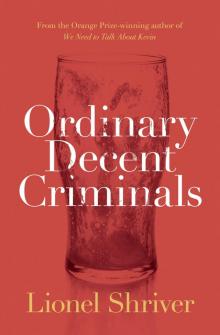 Ordinary Decent Criminals
Ordinary Decent Criminals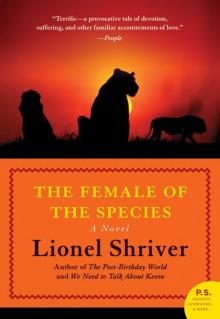 The Female of the Species
The Female of the Species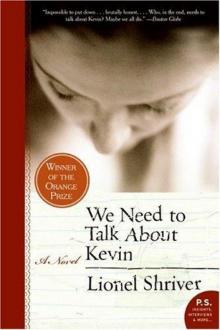 We Need to Talk About Kevin
We Need to Talk About Kevin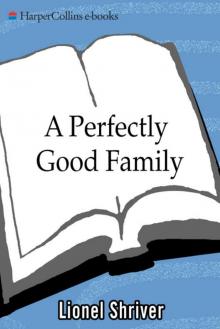 A Perfectly Good Family
A Perfectly Good Family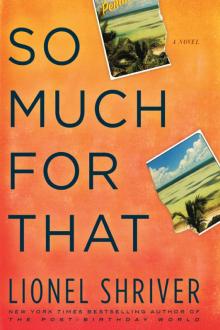 So Much for That
So Much for That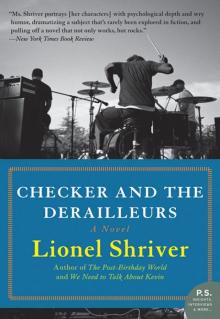 Checker and the Derailleurs
Checker and the Derailleurs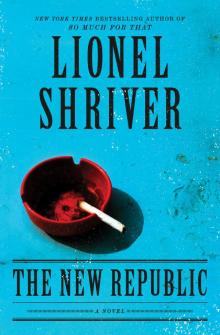 The New Republic
The New Republic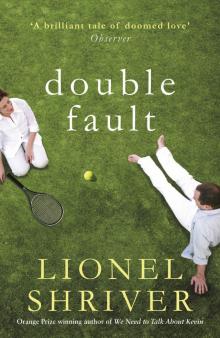 Double Fault
Double Fault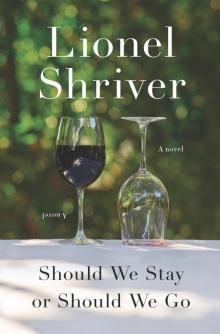 Should We Stay or Should We Go
Should We Stay or Should We Go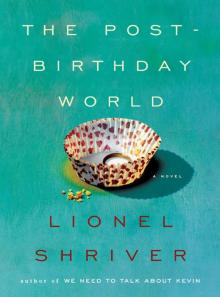 The Post-Birthday World
The Post-Birthday World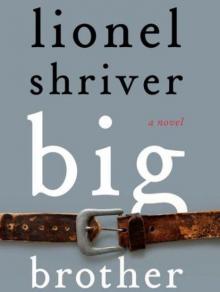 Big Brother
Big Brother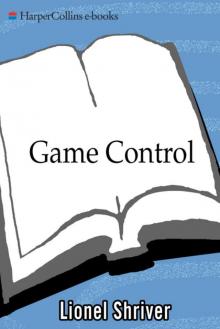 Game Control
Game Control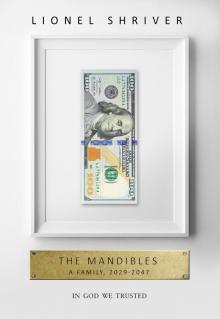 The Mandibles
The Mandibles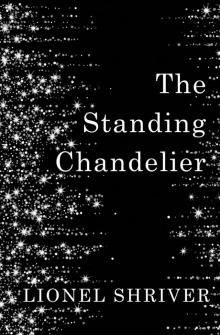 The Standing Chandelier
The Standing Chandelier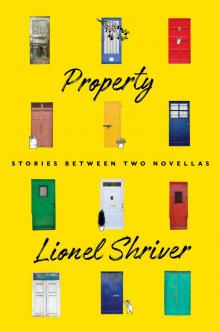 Property
Property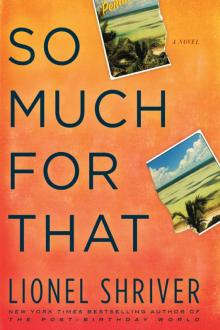 So Much for That: A Novel
So Much for That: A Novel